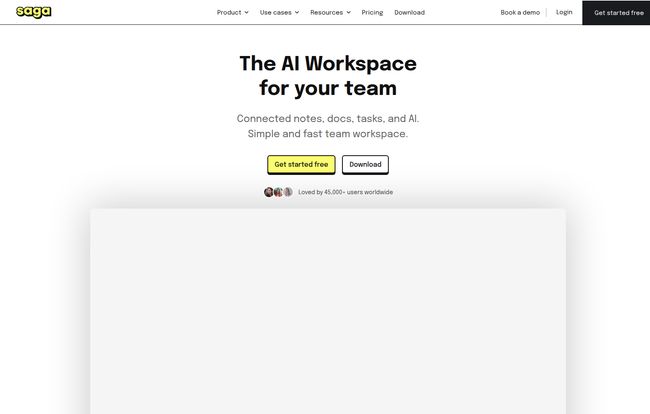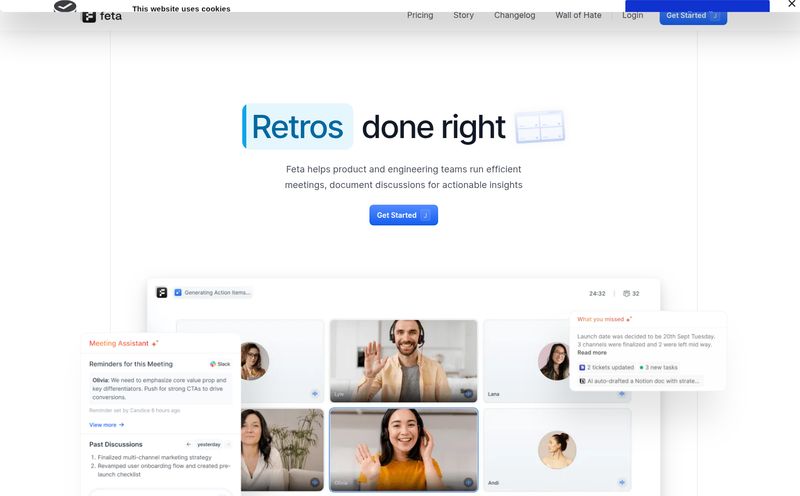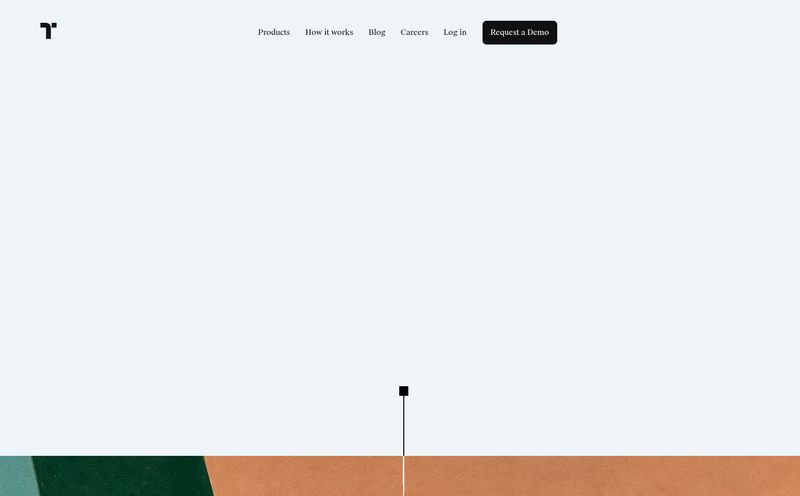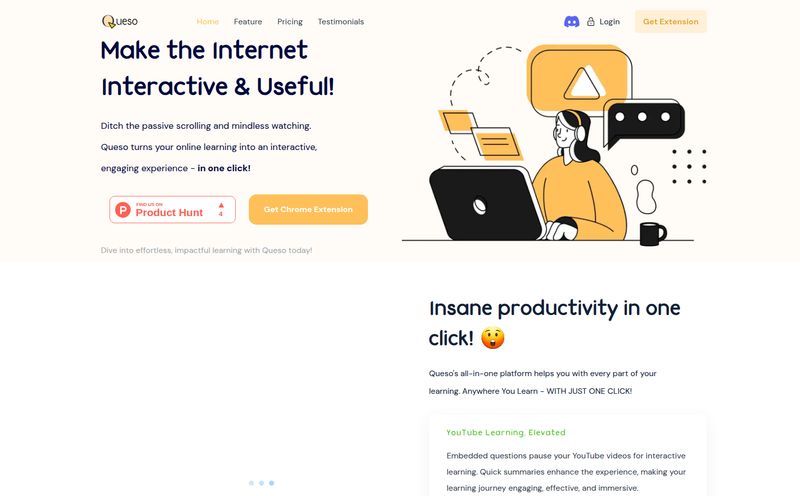If you're anything like me—a content person, an SEO, a marketer, someone who juggles a dozen projects at once—your digital life is probably a bit of a mess. I've been on a years-long quest for the 'perfect' productivity tool. I've built entire second brains in Notion, only to get lost in my own complex databases. I've managed projects in Asana and Trello, but my actual notes and ideas lived somewhere else entirely. It’s a constant battle of a million open tabs and a nagging feeling that a brilliant idea just slipped through the cracks.
So, when another one of these tools lands in my inbox, my first reaction is usually a deep, world-weary sigh. But every now and then, something comes along that feels… different. Less like another empty box to fill and more like a tool that actually understands the workflow. That’s the feeling I got when I started playing around with Saga.
So What is Saga, Anyway?
On the surface, Saga looks familiar. It’s a collaborative workspace for your notes, documents, and tasks. You've heard that one before, right? But here's the twist that got my attention: it’s built from the ground up with AI at its core. It’s not just a ChatGPT plugin clumsily bolted on. The AI is woven into the very fabric of how you work.
Think of it this way. A lot of productivity apps are like getting a giant, empty warehouse. You can store anything in there, but you have to build all the shelves, create the labeling system, and remember where you put everything. Saga is more like having a smart, personal librarian who not only stores your stuff but also reads it, understands it, and finds connections you didn't even know were there. It's fast, it’s clean, and it's designed to get out of your way so you can just… work.

Visit Saga
The Features That Actually Matter
I'm so over tools that boast a million features I'll never touch. Feature bloat is a real productivity killer. Saga seems to get this, focusing on a few things and doing them incredibly well.
Saga AI: Your Built-in Ghostwriter
This is the headline act. Right inside any page you’re writing, you can hit a shortcut and ask the AI to do… well, almost anything. Stuck on a blog post intro? Ask it to write three different versions. Need to summarize a long-winded meeting transcript? Done. Want to translate a client email into Spanish? No problem. It’s like having a brainstorming partner who never needs a coffee break. For me, as someone who writes for a living, this is more than just a novelty; it’s a genuine way to smash through writer’s block.
Connecting the Dots with Automatic Linking
Okay, this is the feature that made me go, “Whoa.” As you write, Saga automatically recognizes concepts, projects, or people you’ve written about before and suggests linking to those pages. It’s a bit like having your own private Wikipedia, built on the fly. You're writing about a new 'CPC campaign', and it instantly finds your notes from that 'Q3 marketing meeting'. The amount of time this saves—not having to manually search and link documents—is kind of staggering. It helps you build a web of knowledge without even trying.
Tasks and Notes Living Together in Harmony
My biggest gripe with most setups is the disconnect between my ideas and my to-do list. The notes about a project are in one app, and the tasks for it are in another. It’s madness! Saga integrates tasks directly into your documents. You can create a checklist right under your project brief or view everything in a clean Kanban board. It’s such a simple concept, but it makes a huge difference in keeping projects on track. Everything related to a project lives in one place. What a concept.
So, How Much Does This Magic Cost? A Look at Saga Pricing
Alright, the all-important question. Is this going to require a second mortgage? Thankfully, no. The pricing structure is pretty straightforward and, in my opinion, very fair.
- Free Plan: This is what I'd call a genuinely useful free tier. You get unlimited pages and tasks for up to 3 team members. The catch is the AI usage is capped at 5,000 words per month. It's more than enough to get a feel for the tool and is perfect for personal projects or a very small team.
- Standard Plan: This starts at $6 per member/month if you pay for the year ($8 if you go monthly). This is the sweet spot. You get everything in the free plan, but with unlimited team members and, crucially, unlimited Saga AI. If you're going to use this for your daily work, this is the one.
- Business Plan: At $12 per member/month (annually), this tier adds more powerful features. The big ones are AI search across your other tools (think Google Drive) and even across the web. It also adds advanced permissions and more guest invites. Some of these features are still being rolled out, which is something to keep in mind.
The yearly discount is significant, so if you commit, it's definitely worth it. You can check out all the nitty-gritty details on their official pricing page.
The Good, The Bad, and The "Coming Soon"
No tool is perfect, and I wouldn't be doing my job if I didn't point out the rough edges. I’ve gotta say, the speed and simplicity are what I love most. It just feels fast. The AI is a core part of the experience, not a gimmick. It feels like a tool for creators, not just for managers.
But, there are downsides. The biggest one for me? There’s no mobile app yet. This is a tough pill to swallow. I do a lot of thinking and note-taking on the go, and not having access on my phone is a definite limitation. I know it’s on their roadmap, but in 2024, it's a big miss. Also, the fact that some of the top-tier Business plan features are still marked as “Coming Soon” means you’re betting a little on future development. Not a deal-breaker, but something to be aware of.
Saga vs. The Titans: Is It a Fair Fight?
Inevitably, people will ask, “Is this better than Notion?” I dont think that’s the right question. It’s not about being better; it’s about having a different philosophy. Notion is an infinite box of LEGOs. You can build absolutely anything—a CRM, a project manager, a website. But you have to be the architect, the builder, and the janitor. It can be powerful, but it can also be exhausting.
Saga is different. It’s not trying to be everything. It’s a focused writing and thinking environment that happens to have great task management and a brilliant AI assistant. It’s less about building systems and more about capturing and connecting ideas, fast. If you've ever felt overwhelmed by Notion’s blank canvas, Saga might be the breath of fresh air you need.
My Final Verdict: Who is Saga Actually For?
After spending a good amount of time with it, I have a pretty clear picture. Saga is for writers, students, researchers, content marketers, and small, agile teams who are tired of feature bloat. It’s for people who value speed and a clean interface over infinite customization.
If your main goal is to capture ideas, write, and turn those thoughts into actionable tasks without friction, I think you’ll love it. If you need to build a complex, relational database to run your entire company, you might want to stick with the bigger platforms for now. For me, it has carved out a real place in my workflow for brainstorming and first drafts. It’s a thinking tool, and a darn good one at that.
Frequently Asked Questions about Saga
Is Saga really free to use?
Yes, Saga has a Free plan that is quite generous. It includes unlimited pages and tasks for up to 3 members per workspace, with a monthly limit on AI usage. It's a great way to start without any financial commitment.
What AI does Saga use?
The platform integrates with some of the latest models, like those from OpenAI (the creators of ChatGPT), to power its AI assistant. The key benefit isn't just the model, but how deeply it's integrated into the workflow for tasks like summarizing, brainstorming, and writing.
Can I use Saga with my team?
Absolutely. It’s designed for real-time collaboration. The Free plan supports up to 3 members, while the paid plans offer unlimited members, making it suitable for teams of various sizes.
Does Saga have a mobile app?
As of late 2023, Saga does not have a dedicated mobile app. This is one of teh most requested features and is reportedly in development. For now, it is primarily a desktop and web-based experience.
How is Saga different from Notion or Coda?
The main difference is focus. While Notion and Coda are powerful, all-in-one platforms that let you build complex systems (like a box of LEGOs), Saga is more focused on being a fast, AI-powered workspace for notes, docs, and tasks. It prioritizes speed and ease of use over infinite customisation.
A Refreshing New Chapter in Productivity
In a market crowded with do-it-all behemoths, Saga's focus is its greatest strength. It’s a sign that the next wave of productivity tools might not be about adding more features, but about intelligently simplifying the ones we use most. It’s not perfect yet, but it’s one of the most interesting and genuinely useful tools I’ve tested in a long time. If you feel like you're drowning in your own productivity system, Saga might just be the life raft you’ve been looking for.
Reference and Sources
- Saga Official Website & Pricing: https://saga.so/pricing



